| Srl | Item |
| 1 |
ID:
114852
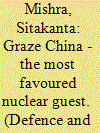

|
|
|
| 2 |
ID:
143173
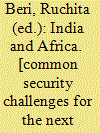

|
|
|
|
|
| Publication |
New Delhi, Pentagon Press, 2016.
|
| Description |
xx, 150p.hbk
|
| Standard Number |
9788182748606
|
|
|
|
|
|
|
|
|
|
|
|
Copies: C:2/I:0,R:0,Q:0
Circulation
| Accession# | Call# | Current Location | Status | Policy | Location |
| 058445 | 327.5406/BER 058445 | Main | On Shelf | General | |
| 058446 | 327.5406/BER 058446 | Main | On Shelf | General | |
|
|
|
|
| 3 |
ID:
123822
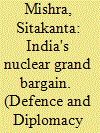

|
|
|
| 4 |
ID:
092997
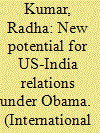

|
|
|
|
|
| Publication |
2009.
|
| Summary/Abstract |
Many in India feared that the burgeoning US--India relationship would collapse under President Obama, but his policies so far have alleviated these concerns. The US has not tried to mediate in Kashmir, has gone ahead on the civil nuclear energy agreement, and entered into a high-level strategic dialogue with India. The biggest potential thorn in US--India relations could be the US approach to Pakistan: Obama could be tempted to tolerate a military-dominated Pakistan and, in order to enable a speedy exit from Afghanistan, could seek a Chinese guarantee in Afghanistan and (indirectly) Pakistan. This would have serious consequences for India and would bring back bitter memories of US instrumentalism in South Asia.
|
|
|
|
|
|
|
|
|
|
|
|
|
|
|
|
| 5 |
ID:
181582


|
|
|
|
|
| Summary/Abstract |
An allied partnership around civilian nuclear power would constitute a strategically important move on the geopolitical chessboard to counter China and Russia.
|
|
|
|
|
|
|
|
|
|
|
|
|
|
|
|
| 6 |
ID:
121658
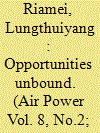

|
|
|
| 7 |
ID:
129871


|
|
|
| 8 |
ID:
156586
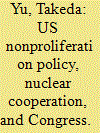

|
|
|
|
|
| Summary/Abstract |
The 1988 revision of the US–Japan Nuclear Cooperation Agreement offers a major precedent both for current US nuclear cooperation policy and for the role played by Congress. Drawing on the Congressional Record and other primary sources, this article examines how US legislators criticized the agreement, forcing the Ronald Reagan administration to alter the subsequent arrangement and abandon the original idea of transporting plutonium by air. Congressional opponents could not prevent the adoption of the agreement outright, partly because of Japan's strong nonproliferation credentials, which helped to allay proliferation concerns. Instead, they focused their concerns on Japan's use of plutonium. By exploiting a split in the administration and stirring environmental concerns over air transportation of plutonium from Europe to Japan, opponents succeeded in affecting the outcome of the agreement. With the agreement up for automatic renewal in July 2018, current congressional concerns over Japan's excess plutonium stocks may play a similar influential role.
|
|
|
|
|
|
|
|
|
|
|
|
|
|
|
|